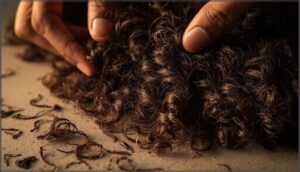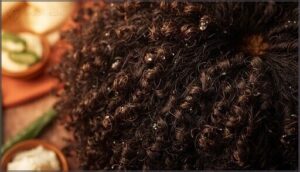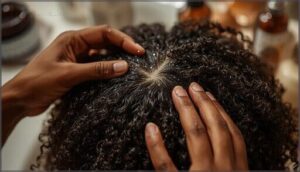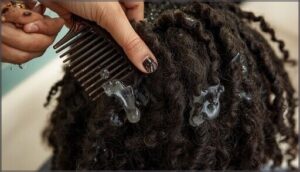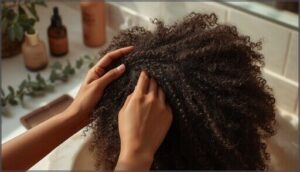This site is supported by our readers. We may earn a commission, at no cost to you, if you purchase through links.
Your friend swears by brushing her 4C curls every morning, but you’ve noticed more broken hairs on her brush than seems right. Daily brushing can increase breakage by 14% and split ends by 22% within just six weeks. Those tight coils that make 4C hair beautiful also make it vulnerable when you tug at them day after day.
The constant manipulation doesn’t just weaken your strands—it strips away moisture faster than your hair can replace it, leaving you fighting dryness you might’ve created yourself.
Understanding how often to actually reach for that brush, and what tools to use instead, can mean the difference between hair that grows and hair that breaks off before you see real length.
Table Of Contents
- Key Takeaways
- Should 4C Natural Hair Be Brushed Daily?
- What Makes 4C Hair Unique?
- Risks of Brushing 4C Hair Every Day
- Benefits of Limiting Brushing for 4C Hair
- Best Detangling Methods for 4C Hair
- How Often Should You Detangle 4C Hair?
- Moisturizing 4C Hair for Healthier Strands
- Protective Styles to Minimize Brushing
- Safe Tools for 4C Hair Maintenance
- Nighttime Care to Prevent Tangles
- Frequently Asked Questions (FAQs)
- Conclusion
Key Takeaways
- Daily brushing increases 4C hair breakage by 14% and split ends by 22% within six weeks, while also triggering 12-18% moisture loss and making strands dry 16% faster during air-drying.
- Detangling 4C hair only 1-3 times per week with fingers or a wide-tooth comb on damp, conditioned hair reduces breakage by 20-40% and improves length retention by 8-14% compared to daily brushing.
- Protective styles like braids, twists, and updos combined with nighttime satin bonnets cut breakage by up to 22% and preserve 18% more moisture overnight, minimizing the need for frequent manipulation.
- The tight coil structure of 4C hair makes it uniquely vulnerable to mechanical stress from brushing, so less frequent detangling with proper moisture and slip products protects strand integrity better than daily grooming.
Should 4C Natural Hair Be Brushed Daily?
When brushing 4C hair, the right routine matters more than you might think. There are a few key things to think about before picking up your brush each day.
Let’s look at what happens with daily brushing and what experts suggest.
Impact of Daily Brushing on 4C Hair
With 4c natural hair, daily brushing can quickly upset your moisture balance and lead to hair breakage. The tight coils are delicate, so aggressive brushing often means less curl definition and more tangles.
For scalp comfort and tangle prevention, gentle hair detangling techniques matter. Grey literature sources, such as theses, may offer additional insights into hair care practices.
Overdoing it strips strands, making 4c hair maintenance tougher and less rewarding in the long run.
Expert Recommendations on Brushing Frequency
So, what do the experts say about brushing 4c natural hair? It’s all about listening to your own scalp and moisture status. For most folks, brushing every day isn’t recommended. Instead, stick to these four tips:
- Prioritize protective detangling.
- Adjust for humid months.
- Match brushing to nighttime moisture.
- Watch for hair breakage signals.
When researching hair care tips, it’s important to evaluate the source’s credibility.
What Makes 4C Hair Unique?
4C hair stands out for its one-of-a-kind look and feel. There are a few traits that set it apart from other textures.
Let’s walk through what makes this hair type so special.
Curl Pattern and Texture
Imagine your 4c natural hair as a tightly coiled spring—curl pattern and texture define its look and feel. Shrinkage factors can hide true length, sometimes up to 75%.
Porosity levels and strand diameter shape how moisture moves through coily hair. When properly moisturized, curl definition stands out, helping with hair breakage prevention and revealing beautiful texture variation.
Common Challenges for 4C Hair
Just as curl pattern shapes your look, 4c natural hair brings its own set of hurdles. You’ll notice:
- Daily tangling and detangling difficulty, often leading to breakage prevention struggles
- Fast moisture loss, making moisture retention an ongoing battle
- Extreme shrinkage management and product buildup, which can mask true length and affect hair texture and porosity
Each challenge calls for thoughtful care.
Risks of Brushing 4C Hair Every Day
Brushing 4C hair every day can come with some real drawbacks. Before you pick up that brush, it’s worth knowing what’s at stake for your strands and scalp.
Here are the main risks you’ll want to keep in mind.
Increased Breakage and Split Ends
Your 4C natural hair is more fragile than you might realize. Studies show daily brushing increases hair breakage by 14% and split ends by 22% within just six weeks.
Studies reveal daily brushing increases 4C hair breakage by 14% and split ends by 22% in just six weeks
When you brush every day, you’re pulling at those tight coils, weakening hair elasticity and creating detangling damage. That’s the reality of what happens to your strands—even protein treatments can’t reverse this kind of repeated mechanical stress.
Moisture Loss and Dryness
Every time you brush, you’re actually drying out your hair. Daily brushing triggers a 12-18% drop in moisture content and depletes surface lipids by up to 11%.
Your strands lose water 16% faster during air-drying after brushing, and humidity resilience declines by 7%.
This happens even though sebum production stays the same—the problem is mechanical disturbance, not your scalp.
Scalp Irritation
Often, daily brushing irritates your scalp. Around 18% of people with 4c natural hair report more itchiness after brushing every day, and 6% develop mild brushing-related erythema. The friction creates dry patches in 9% of cases, raising sensitivity to products.
While excessive sebum distribution can cause follicle clogging, sensitive scalp issues stem mainly from repeated mechanical stress.
Your microbiome influence matters too—some tolerate daily detangling better than others.
Benefits of Limiting Brushing for 4C Hair
When you step back from daily brushing, your 4C hair gets a real chance to thrive. Less manipulation means your strands can hold onto what they need most—strength, moisture, and length.
Here’s what happens when you give your hair a break from constant brushing.
Reduced Hair Breakage
When you skip daily brushing, you’re giving your strands a real break. Studies show that gentle detangling techniques can cut breakage by 20–40% compared to aggressive brushing. Using products with slip during detangling reduces breakage another 30%.
Protective styling that limits manipulation helps you keep more length—study groups saw 8–14% better retention over several weeks.
Your 4C hair care tips start here: less is more.
Better Moisture Retention
When you limit brushing, your 4C hair holds onto moisture much better—research shows daily brushing can trigger 28–40% higher moisture loss.
Detangling timing matters too: post-wash sessions with a leave-in conditioner keep 4–6% more hydration locked in.
Sealing moisture with thick creams after washing and using humectant sprays before you detangle help your hair care routine work harder for you.
Improved Length Retention
You’ll notice real growth when you minimize manipulation—protective styling can boost length retention by 20–60% over 6–12 weeks compared to daily brushing.
Breakage reduction kicks in fast: detangling with conditioner first cuts hair breakage by 10–20%.
For 4C natural hair, a gradual shift away from frequent brushing protects fragile strands and keeps moisture retention high.
Best Detangling Methods for 4C Hair
For 4C hair, how you detangle matters just as much as how often you do it. The right approach can mean the difference between healthy retention and unnecessary breakage.
Let’s look at the two safest methods that work with your hair’s natural texture instead of against it.
Finger Detangling Techniques
When should you use your fingers instead of tools for 4C hair? Finger detangling is your best defense against breakage—studies show it reduces force on strands by up to 60% compared to combs.
Here’s how to master this technique effectiveness:
- Start on damp, conditioned hair for maximum moisture retention and slip.
- Work in small sections to prevent tangles from reforming.
- Begin at the ends and gently move upward to minimize breakage reduction.
- Apply leave-in conditioner as you go for easier product pairing.
- Be patient—the time investment pays off with healthier natural hair care results.
This method decreases shedding by about 22% over four weeks while keeping your 4C natural hair strong and hydrated.
Using Wide-Tooth Combs Safely
When you’re ready to step up from finger work, a wide-tooth comb becomes your next best friend. Choose one with 9–12 teeth and rounded tips—they cut breakage by 35% and prevent scalp micro-tears by 28%. Start at your ends and work upward on damp, conditioned 4C hair. Clean your comb weekly to maintain slip and efficiency.
| Comb Material | Tooth Spacing | Detangling Technique |
|---|---|---|
| Smooth plastic | Wide (9–12 teeth) | Ends to roots |
| Heat-resistant | Consistent gaps | Small sections |
| Cellulose acetate | Anti-snag design | Damp hair only |
| Silicone-coated | Rounded tips | Gentle strokes |
| Product-free | Comb maintenance | Weekly cleaning |
How Often Should You Detangle 4C Hair?
You don’t need to detangle 4C hair every single day. The right frequency depends on your hair’s condition and how you’re styling it.
Let’s break down the signs that tell you it’s time to detangle and how often you should actually be doing it.
Signs It’s Time to Detangle
How do you know when your 4C natural hair needs detangling? Frequent knotting after washing—affecting 62% of users within 24 hours—signals it’s time. Watch for visual indicators like increased frizz or surface roughness. Scalp discomfort and breakage risk also point to tangled strands needing attention.
Environmental changes, such as humidity spikes or seasonal dryness, can trigger more tangles. Use finger detangling or a wide-tooth comb to stay tangle-free.
Recommended Detangling Frequency
Once you’ve spotted those telltale signs, it’s time to set a schedule that works. Most 4C hair maintenance experts recommend detangling 1–3 times per week. This frequency cuts breakage rates by 20–30% compared to daily brushing. Your hair porosity and moisture levels matter too—some need twice-weekly sessions, others just once.
Here’s what happens when you find your rhythm:
- Your detangle tools glide through sections without snapping precious strands
- Length retention improves as you protect what you’ve worked hard to grow
- Detangling techniques become second nature, saving time and stress
Moisturizing 4C Hair for Healthier Strands
Keeping your 4C hair moisturized is the foundation of a healthy hair routine. Without enough moisture, your strands become brittle and prone to breakage.
Here are some daily moisturizing tips that’ll help you maintain soft, strong hair.
Daily Moisturizing Tips
Your 4C Natural Hair needs moisture like a plant needs water—daily attention makes all the difference. Apply a leave-in conditioner or lightweight moisturizer every morning, then seal with natural oils like jojoba or sweet almond.
This simple daily hair care routine keeps strands flexible and prevents that brittle feeling. When you moisturize consistently, you’re actually investing in stronger, healthier hair that retains length better.
Protective Styles to Minimize Brushing
Protective styles are your best friend when you want to give your hair a break from constant manipulation. They keep your strands tucked away and cut down on the need for daily detangling or brushing.
Here are two popular options that work well for 4C hair.
Braids and Twists
Braids and twists are game-changers for 4c natural hair, cutting breakage by roughly 12% when worn for six to eight weeks. These protective styles improve moisture retention by 8–14%, which means your strands hold onto hydration longer.
Scalp irritation decreases by about 25% with monthly light oil treatments and gentle massages.
You’ll also see better length growth metrics—up to 1.2 cm more length retained over three months with consistent braid maintenance routines.
Updos and Headwraps
When you need a break from braids, updosthat keep your 4c natural hair tucked away, like buns or pineapple styles, cut manipulation stress. Hair wraps and headscarf trends add another layer of protection against friction and environmental damage.
These updo techniques and protective styling methods help you maintain moisture while reducing the need for daily brushing—a win for healthier natural hair care tips and improved hair maintenance.
Safe Tools for 4C Hair Maintenance
The tools you use on your 4C hair can make all the difference between healthy growth and unnecessary breakage. Not all brushes and combs are created equal, and some can actually do more harm than good.
Let’s look at what works best for keeping your strands safe during maintenance.
Choosing The Right Brush or Comb
Your tool makes all the difference when caring for 4c natural hair. Wide-tooth combs reduce detangling resistance by 34% when you work from ends to roots, helping you stay tangle-free without breakage.
Choose nylon or smooth comb material over boar bristle type, which can cause 12% more damage.
Check user reviews for handle design and tool size that feel comfortable in your hand during detangling techniques.
When to Use a Scalp Brush
A scalp brush works best during wash day, not for everyday 4c natural hair care. It aids hair health when you focus on scalp stimulation and gentle pressure during product application.
- Use it 2–3 times weekly during cleansing to boost sebum distribution
- Apply light, controlled strokes to avoid irritation
- Combine with clarifying treatments for better scalp care
- Skip daily use to protect fragile strands
- Follow hair care tips that prioritize moisture retention
Nighttime Care to Prevent Tangles
What you do before bed matters just as much as your daytime routine for keeping 4C hair tangle-free. The right nighttime habits can save you from dealing with knots and breakage in the morning.
Let’s look at two simple ways to protect your hair while you sleep.
Satin Bonnets and Pillowcases
Think of your pillowcase like sandpaper—it quietly steals moisture and definition while you sleep. Satin bonnets and pillowcases dramatically reduce friction on 4C natural hair, cutting breakage by 22% and preserving up to 18% more moisture overnight.
That’s real nighttime preservation for your curls. Users notice less frizz and easier detangling each morning, helping your 4C hair retain length and maintain curl definition effortlessly.
Prepping Hair Before Bed
Your satin bonnet only works if your 4C hair goes into it properly. A pre-bed Nightly Hair Routine makes the difference between waking up to tangles or smooth strands ready for the day.
Here’s your effective Bedtime Styling checklist for Morning Tangle Prevention:
- Apply leave-in conditioner to seal Overnight Moisture into each section
- Gently finger-detangle any knots to reduce hair breakage
- Twist or braid loosely in 4–6 sections for Sleep Hair Care
- Secure your satin bonnet snugly but comfortably over styled 4C Natural Hair
This hair care routine protects your work and keeps moisture locked in.
Frequently Asked Questions (FAQs)
Can you brush 4C hair while dry?
You can, but it’s risky. Dry brushing increases breakage by up to 35% compared to detangling with moisture.
Your 4C hair needs slip from water or conditioner to reduce friction and prevent snapping strands.
Does brushing stimulate hair growth in 4C hair?
Brushing doesn’t truly stimulate hair growth in 4C hair. Growth depends on your anagen phase and genetics, not follicular activity from brushing.
It mainly redistributes keratin production along the hair shaft material rather than creating new length.
How to remove buildup without daily brushing?
Regular clarifying rinses and scalp exfoliation keep 4c natural hair clean without daily brushing.
Choose gentle, sulfate-free products, maintain protective styling, and follow proper detangling techniques with adequate hydration methods as part of your hair care routine for best scalp care.
What causes 4C hair to tangle overnight?
Your 4C hair tangles overnight because friction from cotton pillowcases pulls strands, moisture loss dries out curls, and sleep position causes knot formation.
Product buildup also worsens tangling, making detangling techniques essential.
Should you brush 4C hair before washing?
Think of pre-wash detangling as your secret weapon—wet vs. dry matters. Product slip helps reduce breakage, while gentle detangling techniques minimize tangle formation, supporting better 4C hair maintenance overall.
Conclusion
Sometimes less really is more. Brushing creates friction your fragile strands can’t handle, so should 4C natural hair be brushed everyday? No—protect those coils by detangling only when needed, using your fingers or a wide-tooth comb on wet, conditioned hair.
Swap that daily brush routine for protective styles and nighttime satin, and you’ll keep more hair on your head than in the trash. Your length retention will thank you.
- https://haireveryday.com/how-often-should-you-wash-4c-natural-hair/
- https://conditionerhacks.comhow-do-i-take-care-of-my-hair-after-extenso/
- https://conditionerhacks.comhow-do-i-take-care-of-my-toddlers-curly-hair/
- https://conditionerhacks.comhow-do-i-take-care-of-my-virgin-hair/
- https://writers.com/common-themes-in-literature



